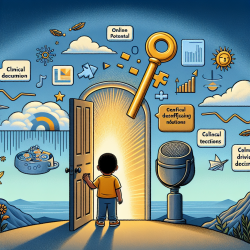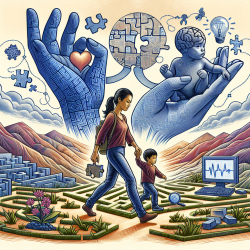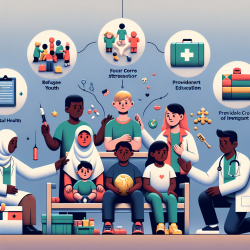Introduction
In the realm of speech-language pathology and online therapy services, ensuring the privacy and confidentiality of patient information is paramount. The recent research paper, A certified de-identification system for all clinical text documents for information extraction at scale, presents a groundbreaking approach to handling clinical data. This blog will explore how practitioners can leverage these findings to enhance their skills and improve outcomes for children in educational settings.
The Power of De-identified Data
The research conducted by Radhakrishnan et al. (2023) introduces Philter V1.0, a certified de-identification pipeline that complies with the Health Insurance Portability and Accountability Act (HIPAA) Privacy Rule. This system allows researchers to access vast amounts of clinical data without the need for additional Institutional Review Board (IRB) approvals. This is particularly significant in fields like speech-language pathology, where access to comprehensive data can drive evidence-based practices and improve therapeutic outcomes.
Implementing the Research Findings
For practitioners in the field of speech-language pathology, the implications of this research are profound. Here are some ways to incorporate these findings into practice:
- Enhanced Data Access: By utilizing de-identified clinical notes, practitioners can gain insights into patient histories, treatment plans, and outcomes, enabling more tailored and effective interventions.
- Research Collaboration: The availability of de-identified data fosters collaboration among researchers and clinicians, leading to the development of innovative therapeutic strategies and interventions.
- Continuous Improvement: Access to a rich dataset allows practitioners to continuously evaluate and refine their approaches, ensuring that they are aligned with the latest evidence-based practices.
Encouraging Further Research
While the research provides a robust framework for de-identification, it also opens the door for further exploration. Practitioners are encouraged to engage in research initiatives that utilize de-identified data to address specific challenges in speech-language pathology. By contributing to the body of knowledge, practitioners can help shape the future of therapeutic interventions and improve outcomes for children.
Conclusion
The research by Radhakrishnan et al. (2023) offers a transformative approach to handling clinical data, with significant implications for speech-language pathology and online therapy services. By embracing these findings, practitioners can enhance their skills, foster collaboration, and ultimately create better outcomes for children. To read the original research paper, please follow this link: A certified de-identification system for all clinical text documents for information extraction at scale.










